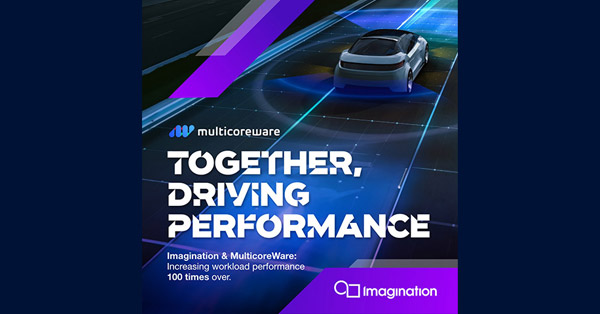SAN JOSE, Calif., Jan. 4, 2024 /PRNewswire/ — MulticoreWare Inc and Imagination Technologies announce that they have enabled GPU compute on the Texas Instruments TDA4VM processor, unleashing around 50 GFLOPS of extra compute and demonstrating a massive improvement in the performance of common workloads used for autonomous driving and advanced driver assistance systems (ADAS).
The collaboration has achieved over 100x performance gains when running a stereo block matching (StereoBM) algorithm on the GPU rather than on the CPU on a high resolution (3200×2000) image. This enables automotive customers to use IMG BXS GPUs with OpenCL™ to achieve maximum performance per watt on TDA4 SoCs for sensor processing workloads (camera, radar, and lidar) augmenting other compute accelerators existing in the platform.
Vish Rajalingam, VP & GM, Mobility & Transportation BU, MulticoreWare, said, “The automotive software revolution is driving the need for seamless intelligent features on low-power SoCs. Our experience with OpenCL and Edge AI across all major AI accelerators, GPUs, and SoCs unlocks incredible possibilities for the future of mobility. We’re thrilled to partner with Imagination and their customers to collaboratively transform this exciting landscape.”
MulticoreWare optimized the StereoBM algorithm to leverage GPU cores efficiently. The IMG BXS-4-64 GPU intrinsics and adaptive memory handling helped achieve optimal performance on higher resolution camera data.
Jake Kochnowicz, VP of Product Management, Imagination, said, “The graphics processor can do so much more in a car than its traditional job of rendering pixels on the displays. It is also a flexible, programmable, and high-performance option for supporting a vehicle’s ADAS workloads. In a world where hardware is agreed very early in the lifecycle of a software-defined vehicle, GPUs are becoming a key differentiator that can unlock new functionality with a user-friendly software environment, just as this partnership with MulticoreWare has demonstrated.”
About MulticoreWare
MulticoreWare delivers software IP Solutions and Engineering Services serving a wide group of customers with Compilers & Toolchains, Libraries for SDK, Video codec and AI analytics solutions using various vision & non-vision sensors on various Heterogeneous Computing Platforms. See https://multicorewareinc.com
About Imagination Technologies
Imagination Technologies is a UK-based company that creates RISC-V CPU, GPU & AI software IP (intellectual property) designed to give its customers an edge in competitive global technology markets. See https://www.imaginationtech.com/





























